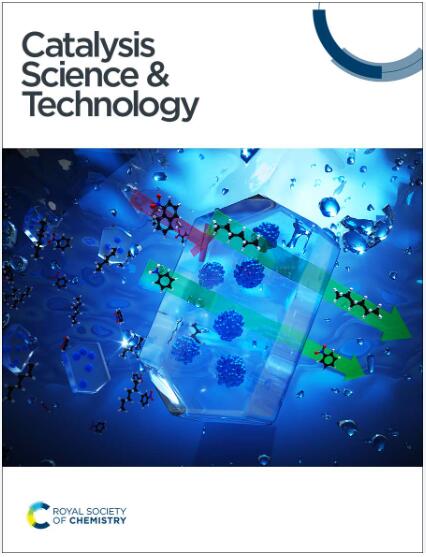Stability enhancement of an integrated ZnO/Zn3As2/SrTiO3 photocatalyst for photocatalytic overall water splitting†
IF 4.2
3区 化学
Q2 CHEMISTRY, PHYSICAL
引用次数: 0
Abstract
Visible and infrared radiation account for approximately 95% of the solar energy input to the Earth. However, only a few long-wavelength responding catalysts have been reported thus far. In order to achieve the goal of solar hydrogen scale-up generation, it is essential to develop a novel catalyst that can work in the main visible region (400–700 nm) or beyond. Zn3As2, a potential candidate that is sensitive to this light region, suffers from serious photo-corrosion and low stability in photocatalytic overall water-splitting (OWS) reactions. In this study, a stable ZnO/Zn3As2/SrTiO3 heterojunction photocatalyst was developed, which exhibited remarkably enhanced stability and operated for over 5 cycles in 15 hours without significant activity decay. In contrast, the naked Zn3As2 only presented a few minutes of activity. The pronounced stability and activity enhancement were due to the faster charge separation facilitated by the heterojunction of SrTiO3 and ZnO/Zn3As2 and the protection of Zn3As2 from photo-corrosion from oxygen and water oxidation by the ZnO layer. This work provides valuable insights into a new strategy for developing stable OWS photocatalysts for solar hydrogen production and energy storage.

集成ZnO/Zn3As2/SrTiO3光催化剂在光催化整体水分解中的稳定性增强
可见光和红外线辐射约占输入地球的太阳能的95%。然而,目前报道的长波长反应催化剂很少。为了实现太阳能氢气规模化生产的目标,必须开发一种能够在主可见区域(400-700纳米)或更远的区域工作的新型催化剂。Zn3As2是一种对该光区敏感的潜在候选材料,但在光催化整体水分解(OWS)反应中存在严重的光腐蚀和低稳定性。在本研究中,制备了一种稳定的ZnO/Zn3As2/SrTiO3异质结光催化剂,其稳定性显著增强,在15小时内运行超过5个循环,没有明显的活性衰减。相比之下,裸Zn3As2只表现出几分钟的活动。由于SrTiO3和ZnO/Zn3As2的异质结促进了更快的电荷分离,以及ZnO层保护Zn3As2免受氧和水氧化的光腐蚀,从而显著提高了稳定性和活性。这项工作为开发用于太阳能制氢和储能的稳定OWS光催化剂提供了有价值的新策略。
本文章由计算机程序翻译,如有差异,请以英文原文为准。
求助全文
约1分钟内获得全文
求助全文
来源期刊

Catalysis Science & Technology
CHEMISTRY, PHYSICAL-
CiteScore
8.70
自引率
6.00%
发文量
587
审稿时长
1.5 months
期刊介绍:
A multidisciplinary journal focusing on cutting edge research across all fundamental science and technological aspects of catalysis.
Editor-in-chief: Bert Weckhuysen
Impact factor: 5.0
Time to first decision (peer reviewed only): 31 days
 求助内容:
求助内容: 应助结果提醒方式:
应助结果提醒方式:


